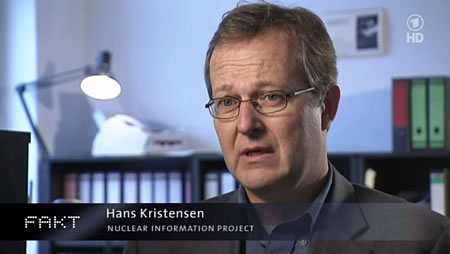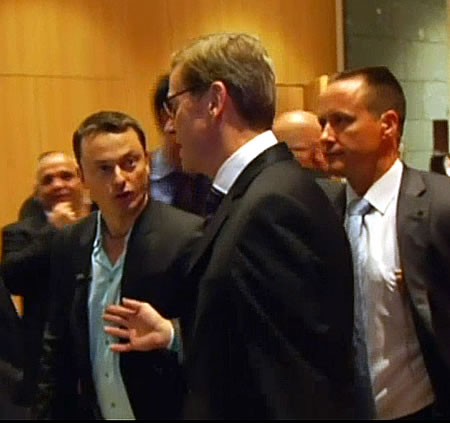Germany and B61 Nuclear Bomb Modernization
 |
| During a recent visit to Germany I did an interview with the Mitteldeutscher Rundfunk magazine FAKT on the status of the B61 nuclear bomb modernization. |
.
By Hans M. Kristensen
Last week, I was in Berlin to testify before the Disarmament Subcommittee of the German Parliament’s Foreign Affairs Committee on the future of the U.S. B61 nuclear bombs in Europe (see my prepared remarks and fact sheet).
One of the B61 bombs currently deployed in Europe is scheduled for an upgrade to extend its life and add new military capabilities and use-control features. The work has hardly begun but the project is already behind schedule and the cost has increased by more than 150 percent in two years, from $4 billion to $10.4 billion. The subcommittee wanted to know if the program is in trouble. I said I believe it certainly is.
The German television magazine FAKT did an interview (article; video) with me and it came as somewhat of a surprise to them that the B61 life-extension will not install a fire-resistant pit to improve the safety of the weapon. They also tried to get German Foreign Minister Guido Westerwelle on the program. The policy of the German government coalition is to try to have nuclear weapons removed from Germany and Westerwelle has publicly promoted this position clearly in the past. This time he did not want to talk, however, as journalists and camera-teams chased him down the hallway. He may have gotten shell-shocked by the pushback from the old nuclear guard in NATO.
 |
| German Foreign Minister Guido Westerwelle did not want to talk with MDR FAKT about withdrawal of US nuclear weapons. |
.
Although NATO recently determined that the current nuclear posture in Europe meets the Alliance’s deterrence and defense needs, NATO has decided – with German backing – to introduce a new precision-guided nuclear bomb in Europe with increased military capabilities at the end of the this decade for delivery by a new stealthy aircraft.
During my briefing to the foreign affairs committee I urged Germany to continue to push for a withdrawal. Otherwise it will have to explain to the German public why it has decided instead to support deployment of precision-guided nuclear bombs on stealth-delivered aircraft in Europe. The two positions will be hard to square.
This publication was made possible by a grant from the Ploughshares Fund. The statements made and views expressed are solely the responsibility of the author.
The last remaining agreement limiting U.S. and Russian nuclear weapons has now expired. For the first time since 1972, there is no treaty-bound cap on strategic nuclear weapons.
The Pentagon’s new report provides additional context and useful perspectives on events in China that took place over the past year.
Successful NC3 modernization must do more than update hardware and software: it must integrate emerging technologies in ways that enhance resilience, ensure meaningful human control, and preserve strategic stability.
The FY2026 National Defense Authorization Act (NDAA) paints a picture of a Congress that is working to both protect and accelerate nuclear modernization programs while simultaneously lacking trust in the Pentagon and the Department of Energy to execute them.